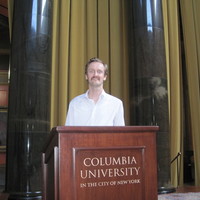
Alexander Mirkovik
Dr. Alex Mirkovik's specialty is History of Christianity and European History focusing on the interaction between Christianity, Judaism, and Islam in the Mediterranean. Currently he is pursuing his second career as an opera singer. He was a Michigan Faculty Fellow at Eisenberg Institute, History Department, University of Michigan. He previously taught at Eastern Michigan University, Northern Michigan University, Arkansas Tech University, McNeese State University, and the University of South Florida.
His current research project is focused on the history of Armenians in the 19th and 20th centuries. He also works on the history of food, in particular on the spread of tea, coffee, and chocolate in Europe. He is especially interested in how these popular drink shaped and re-enforced national and imperial identity. His research interests include intellectual history, religion and nationalism, urban history, and history of science.
Dr. Mirkovik was an assistant editor of the ABC-CLIO World History Encyclopedia, Crisis and Achievement: 1900-1945, and assistant editor of the World History Bulletin, the official publication of the World History Association.
In addition, Dr. Mirkovik is the author of “From Courtly Curiosity to Revolutionary Refreshment: Turkish Coffee and English Politics in the Seventeenth Century” and “Prelude to Constantine: The Abgar Tradition in Early Christianity.”
In his spare time, Dr. Mirkovik is an opera fanatic and a tenor, with a passion for Italian and Spanish music. He enjoys salsa and swing dancing as well as sailing.
EDUCATION: Ph.D., Vanderbilt University. M.A., University of South Florida. Diploma, National and Kapodistrian University of Athens.
His current research project is focused on the history of Armenians in the 19th and 20th centuries. He also works on the history of food, in particular on the spread of tea, coffee, and chocolate in Europe. He is especially interested in how these popular drink shaped and re-enforced national and imperial identity. His research interests include intellectual history, religion and nationalism, urban history, and history of science.
Dr. Mirkovik was an assistant editor of the ABC-CLIO World History Encyclopedia, Crisis and Achievement: 1900-1945, and assistant editor of the World History Bulletin, the official publication of the World History Association.
In addition, Dr. Mirkovik is the author of “From Courtly Curiosity to Revolutionary Refreshment: Turkish Coffee and English Politics in the Seventeenth Century” and “Prelude to Constantine: The Abgar Tradition in Early Christianity.”
In his spare time, Dr. Mirkovik is an opera fanatic and a tenor, with a passion for Italian and Spanish music. He enjoys salsa and swing dancing as well as sailing.
EDUCATION: Ph.D., Vanderbilt University. M.A., University of South Florida. Diploma, National and Kapodistrian University of Athens.
less
Related Authors
Johannes Zachhuber
University of Oxford
Sheilagh Ogilvie
University of Oxford
Edith Szanto
University of Alabama - Tuscaloosa
Armando Salvatore
McGill University
Sean W . Anthony
Ohio State University
Alejandra B Osorio
Wellesley College
Cristiana Facchini
Università di Bologna
Maria Cristina La Rocca
Università degli Studi di Padova
Marek Tamm
Tallinn University
Roe Fremstedal
Norwegian University of Science and Technology
InterestsView All (32)










Uploads
Conference Presentations by Alexander Mirkovik
Papers by Alexander Mirkovik
historian, philosopher, theologian, and his ideological transformations as he came to New York City in 1948, in particular to Morningside Heights, to be a professor of Church history and dean of the newly founded St Vladimir Theological Seminary.
Books by Alexander Mirkovik
from the Big Bang to the present human networking of the planet, are becoming more and more popular. This volume includes a number of the exciting works in this relatively new
field that, along with a macroevolutionary approach, seek to develop an inclusive view of the Cosmos, Earth, life and humanity by erasing boundaries between disciplines.
This volume is the second in a series of almanacs that has Evolution as its general subject and title. This volume is also a special edition with the subtitle: A Big History Perspective. We have tried to collect a wide variety of contributions by very different authors – not only from different countries, but also authors who have very different educational backgrounds (historians, astrophysicists, biologists, sociologists, geologists, psychologists, archaeologists and others). All of them have come to the shared understanding that we need
a unified picture of the evolution of the Universe.
The first section of the Almanac (‘Evolution and Understanding of Big History’) presents articles analyzing the evolution of views on the development of the Universe and
the Big History concept itself. The second section (‘Big History's Trends and Phases’) analyzes major phases of Big History (cosmic, geological, biological, social), including
some possible forecasts. The third section (‘Essays on Big History’) considers literature, art and poetry, as well as the teaching of children and personal views of the world – all
through the prism of Big History.
This Almanac will be useful both for those who study interdisciplinary macroproblems and for specialists working in focused directions, as well as for those who are interested
in evolutionary issues of Astrophysics, Geology, Biology, History, Anthropology, Linguistics and other areas of study. More than that, this edition will challenge and excite your vision of your own life and the exciting new discoveries going on around us!
historian, philosopher, theologian, and his ideological transformations as he came to New York City in 1948, in particular to Morningside Heights, to be a professor of Church history and dean of the newly founded St Vladimir Theological Seminary.
from the Big Bang to the present human networking of the planet, are becoming more and more popular. This volume includes a number of the exciting works in this relatively new
field that, along with a macroevolutionary approach, seek to develop an inclusive view of the Cosmos, Earth, life and humanity by erasing boundaries between disciplines.
This volume is the second in a series of almanacs that has Evolution as its general subject and title. This volume is also a special edition with the subtitle: A Big History Perspective. We have tried to collect a wide variety of contributions by very different authors – not only from different countries, but also authors who have very different educational backgrounds (historians, astrophysicists, biologists, sociologists, geologists, psychologists, archaeologists and others). All of them have come to the shared understanding that we need
a unified picture of the evolution of the Universe.
The first section of the Almanac (‘Evolution and Understanding of Big History’) presents articles analyzing the evolution of views on the development of the Universe and
the Big History concept itself. The second section (‘Big History's Trends and Phases’) analyzes major phases of Big History (cosmic, geological, biological, social), including
some possible forecasts. The third section (‘Essays on Big History’) considers literature, art and poetry, as well as the teaching of children and personal views of the world – all
through the prism of Big History.
This Almanac will be useful both for those who study interdisciplinary macroproblems and for specialists working in focused directions, as well as for those who are interested
in evolutionary issues of Astrophysics, Geology, Biology, History, Anthropology, Linguistics and other areas of study. More than that, this edition will challenge and excite your vision of your own life and the exciting new discoveries going on around us!